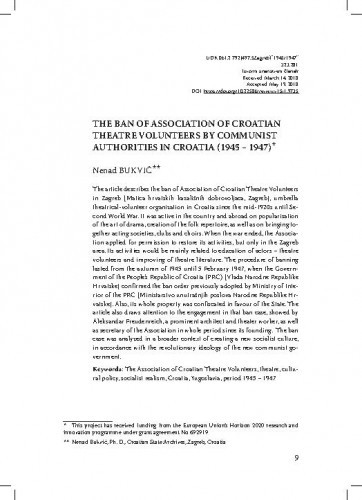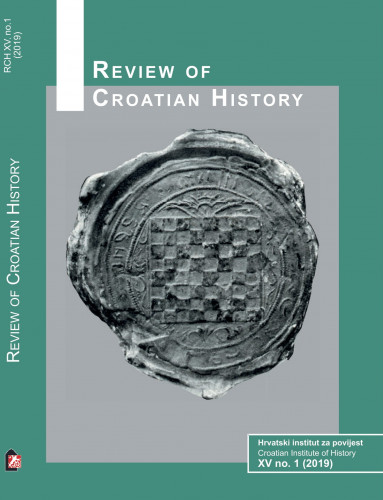The article describes the ban of Association of Croatian Theatre Volunteers in Zagreb [Matica hrvatskih kazališnih dobrovoljaca, Zagreb], umbrella theatrical-volunteer organization in Croatia since the mid-1920s until Second World War. It was active in the country and abroad on popularisation of the art of drama, creation of the folk repertoire, as well as on bringing together acting societies, clubs and choirs. When the war ended, the Association applied for permission to restore its activities, but only in the Zagreb area. Its activities would be mainly related to education of actors – theatre volunteers and improving of theatre literature. The procedure of banning lasted from the autumn of 1945 until 5 February 1947, when the Government of the People's Republic of Croatia (PRC) [Vlada Narodne Republike Hrvatske] confirmed the ban order previously adopted by Ministry of Interior of the PRC [Ministarstvo unutrašnjih poslova Narodne Republike Hrvatske]. Also, its whole property was confiscated in favour of the State. The article also draws attention to the engagement in that ban case, showed by Aleksandar Freudenreich, a prominent architect and theater worker, as well as secretary of the Association in whole period since its founding. The ban case was analyzed in a broader context of creating a new socialist culture, in accordance with the revolutionary ideology of the new communist government.; Der Artikel befasst sich mit dem Verbot des in Zagreb tätigen kroatischen Theaterfreiwilligenvereins. Der Verein war eine Dachorganisation von Theaterfreiwilligen, die ab Mitte der 1920er bis zum Zweiten Weltkrieg im In- und Ausland tätig war. Er widmete sich der Popularisierung der Schauspielkunst, der Schaffung eines Volksrepertoires wie auch der Organisation von Schauspielvereinigungen, -klubs und -chören. Als der Krieg zu Ende war, beantragte der Verein eine Genehmigung für die Wiederaufnahme seiner Tätigkeit, aber nur innerhalb von Zagreb. Seine Aktivitäten bezogen sich hauptsächlich auf die Ausbildung von Schauspielern ‒ Theaterfreiwilligen sowie auf die Verbesserung der Theaterliteratur. Das Verbotsverfahren dauerte vom Herbst 1945 bis zum 5. Februar 1947, als die Regierung der Volksrepublik Kroatien (VRK) den Verbotsbefehl bestätigte, den zuvor das Innenministerium der VRK erlassen hatte. Das Gesamtvermögen des Vereins wurde vom Staat beschlagnahmt. Der Artikel geht auch auf den Einsatz des prominenten Architekten und Theaterarbeiters Aleksandar Freudenreich im Zusammenhang mit diesem Verbot ein, der selbst Sekretär des Vereins seit seiner Gründung gewesen war. Das Verbot wird im breiteren Kontext der Schaffung einer neuen sozialistischen Kultur analysiert, die im Einklang mit der revolutionären Ideologie der neuen kommunistischen Behörden stand.
Sažetak

 Review of Croatian history : Revue für kroatische Geschichte = Revue d'histoire croate : 15,1(2019) / editor-in-chief, Chefredakteur Mario Jareb.
Review of Croatian history : Revue für kroatische Geschichte = Revue d'histoire croate : 15,1(2019) / editor-in-chief, Chefredakteur Mario Jareb.